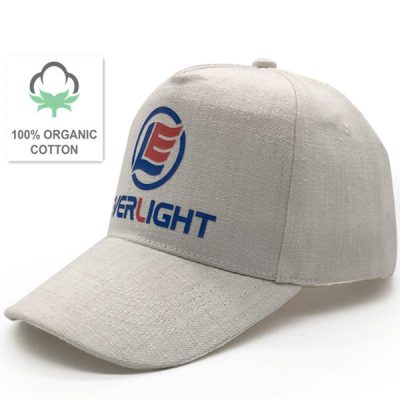https://everlight-trade.com/product/100-organic-baseball-cap/

Organic cotton refers to cotton that is grown using farming methods that avoid the use of synthetic chemicals, pesticides, or fertilizers.It relies on natural and sustainable practices designed to maintain soil health, promote biodiversity, and reduce environmental impact.
organic cotton is seen as a more eco-friendly and socially responsible alternative to conventional cotton, aligning with the growing demand for sustainable and ethical products.
Compared with conventional cotton, organic cotton has some characteristics:
1. Farming Methods
Grown using organic farming methods that prohibit synthetic pesticides, herbicides, and fertilizers.
Uses natural methods like crop rotation, green manure, and composting to enrich the soil.
Relies on organic, non-GMO seeds.
Uses natural pest control (e.g., beneficial insects, natural insect repellents) rather than synthetic chemical pesticides.
Emphasizes soil health and biodiversity.
2. Environmental Impact
Less Water Consumption: Organic cotton farming tends to use water more efficiently due to healthier soil that retains moisture better.
Lower Carbon Footprint: By avoiding chemical inputs, organic cotton farming tends to have a smaller carbon footprint.
Reduced Soil Degradation: Organic farming practices focus on long-term soil health, reducing the risk of soil erosion and improving overall soil fertility.
Biodiversity Preservation: Organic cotton fields often support more diverse ecosystems, including beneficial insects, birds, and plants.
3. Health and Safety
Safer for Farmers and Workers: Since organic cotton avoids harmful pesticides and chemicals, it creates a safer environment for farmers and workers in the cotton fields.
Healthier for Consumers: Organic cotton textiles are free from toxic chemical residues, making them safer for consumers, particularly those with sensitive skin or allergies.
4. Yield and Cost
Lower Yields: Organic cotton typically produces fewer crops per acre than conventional cotton due to the absence of chemical fertilizers and pesticides.
Higher Cost: The farming practices used in organic cotton production, including the use of natural pest control and the need for more labor, can result in higher production costs, which may lead to higher prices for consumers.
5. Certification and Standards
Organic cotton must meet specific standards and certifications, such as Global Organic Textile Standard (GOTS) or OEKO-TEX, which ensure that it is grown and processed without synthetic chemicals and adheres to sustainable practices.
6. Sustainability
Part of a more sustainable and eco-friendly agriculture system. By promoting biodiversity, reducing chemical pollution, and using natural fertilizers, organic cotton helps preserve the environment for future generations.
7. Market Demand
Gaining popularity with consumers who prioritize sustainability, ethical production, and eco-friendly products. Organic cotton is often found in premium and eco-conscious brands, including clothing, bedding, and baby products.
In conclusion, organic cotton is a more environmentally friendly and health-conscious alternative to conventional cotton, but it comes with higher costs and lower yields. Conventional cotton, while cheaper and more widely available, has significant environmental and health drawbacks.